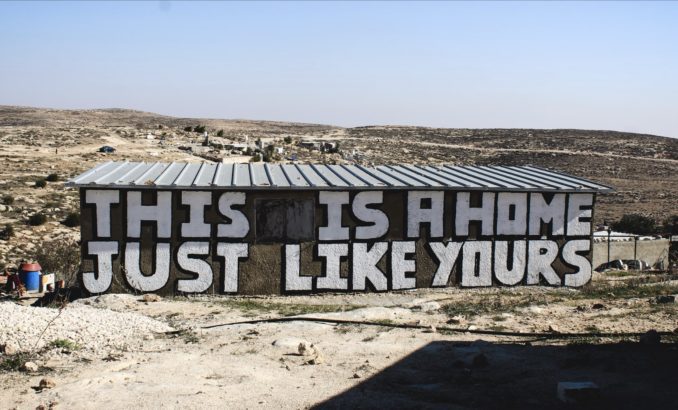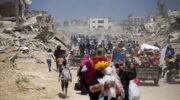The Intercept recently featured an in-depth article describing Israel’s decades-long campaign of discrimination and violence against Palestinians – in a way that begins to capture the magnitude of the injustice. The many forms of mistreatment require a lengthy article. IAK has broken it into four manageable parts which we will release over the next several days.
In Part One, read about the case of the hamlets of Masafer Yatta, where Israeli policy is trying to force Palestinians to leave – either by discriminatory legislation or intimidation and violence.
by Alice Speri, reposted from The Intercept, April 1, 2023
On very clear days, you can follow the rolling hills surrounding the Palestinian city of Yatta all the way to the Dead Sea on one side, the Negev desert on the other. The windswept landscape offers idyllic views, with clusters of olive trees alternating with narrow rows of cultivated land, patches of shrubs, and the occasional grazing sheep. This is also a unique observation point to watch the reality of Israeli apartheid take hold of the land.
Masafer Yatta, a collection of hamlets in the pastoral hills surrounding Yatta, is one of several areas across the occupied West Bank where the Israeli state has for decades forced out Palestinians and replaced them with Israeli settlers. The goal, as Israeli Prime Minister Benjamin Netanyahu stated plainly after returning to power last year, is to give the state absolute and ultimate control over what he called “all areas of the Land of Israel” —including land widely expected to one day form the territory of a Palestinian state.
The Israeli government has deployed an array of legal and policy pretexts to extend its domination of the West Bank, most notably by supporting the more than half a million Israeli settlers who illegally moved there. Since a new, far-right coalition took power, Israel has been roiled by mass protests that reached an apex this week, as hundreds of thousands of Israelis took to the streets to oppose plans by Netanyahu — who is currently fighting corruption charges — to severely curtail the independence of the country’s judiciary.
But the political crisis means little to Palestinians, including the 1.6 million with Israeli citizenship, who have long viewed Israel’s courts as complicit in their oppression, and the legal system many Israelis are now rushing to defend as an enabler to the regime of racial domination forced upon them.
“Palestinians know that Israel has only ever been a democracy for its Jewish citizens, and never for us,” George Bisharat and Jamil Dakwar wrote in an op-ed for Haaretz this week. “What we are witnessing today is an internal Israeli Jewish struggle over who will administer an apartheid regime over the Palestinians, not a genuine fight for democracy for all.”
Masafer Yatta
Few Israelis took to the streets last May, for instance, when Israel’s highest court put an end to a decades-long legal battle Palestinian residents of a dozen communities in Masafer Yatta had been fighting to stay on their lands — inside what Israel had unilaterally declared a “firing zone.” The proceedings followed Israel’s declaration in the 1980s of a large section of Masafer Yatta as a restricted, military area for the army to train in.
Since then, Palestinians living there faced forcible expulsions, frequent home demolitions, rising settler violence, and a host of other coercive measures seeking to drive them off the land — all while illegal Israeli settlements expanded around them with no consequence.
Last May, their legal battle ended when the same court whose legitimacy hundreds of thousands of Israelis are now fighting to preserve ruled definitively that there are no “legal barriers” to the planned expulsion of Palestinians from the firing zone.
The court — which is Israel’s Supreme Court but rules as the High Court of Justice when deciding matters of state authority, as in the Masafer Yatta case — is made up of 15 judges. The court is being targeted by Netanyahu, who wants to change the way judges are selected as well as the laws the court can rule on, in addition to giving Parliament the power to overturn its decisions.
Last May’s ruling, the final one on the Masafer Yatta case, essentially sanctioned the forcible transfer of Palestinians from the firing zone — even as the forcible transfer of an occupied population is a form of ethnic cleansing and, under international law standards, a war crime.

Making life impossible
The Masafer Yatta ruling has brought renewed international attention to this pocket of the southern West Bank and prompted widespread condemnation of Israeli actions. But it has also intensified the Israeli military’s and settlers’ joint efforts to force the nearly 1,200 Palestinians who remain in the firing zone to leave.
Harassment of local residents has become a daily affair, and violent attacks by settlers are on the rise. For the Palestinians who have already lived in limbo for three decades, the court’s decision means that they may now face forcible transfer any day — even as human rights observers note that efforts to drive them out are likely going to be more insidious so as not to draw further global condemnation.
“We don’t believe we’re going to see people put on trucks and being transferred — although it could happen — because of the optics of it,” said Dror Sadot, a spokesperson for the Israeli human rights group B’Tselem, during a recent visit to the firing zone, noting that Israeli authorities did force people onto trucks in an earlier effort to evacuate the area in 1999.
“Instead, what we’re seeing already, and what we think we’re going to see even more, is efforts to make their lives impossible to live. Demolitions, checkpoints, confiscating cars. They really isolate these communities and basically try to do everything they can to make them leave.”
A spokesperson for the Israel Defense Forces wrote in an email to The Intercept that “in the ruling of the Supreme Court on May 4th, 2022, the Court approved the State’s position which determined that at the time of the declaration of the area as a closed zone, the area was uninhabited” — even though dozens of families lived in the area at the time.
“In recent months, dialogue has been held with the Palestinians in the area, in order to enable them to leave the closed zone in an agreed upon and independent manner,” the spokesperson added. “The training zone has great importance for training security personnel including in the use of live fire, which cannot be carried out effectively with civilians present in the area.”
In recent years, a growing number of global human rights organizations has begun to describe the Israeli state’s control of Palestinians as a form of apartheid — a parallel to South Africa that Palestinians themselves had been drawing for decades. The political backlash has been fierce, even as those reports — by Human Rights Watch, Amnesty International, but also the Harvard Law School’s International Human Rights Clinic and the Israel-based B’Tselem — have offered careful legal analysis to explain their conclusions, and referred to an established, legal definition of the crime of apartheid as defined under multiple international statutes.
Left with no other recourse, Palestinians have increasingly taken their plight to the international community and international mechanisms of justice like the International Criminal Court, which includes apartheid under the crimes against humanity over which it has jurisdiction, and which in 2021 opened an investigation on the situation in Palestine.
Until now, those seeking to defend Israel’s conduct have largely done so by referring to its [supposed] democratic character, including the [supposed] integrity and independence of its judiciary, even as Palestinians have long argued Israel is no democracy when it comes to them.
Culture of hyper-legalization
Rabea Eghbariah, a human rights attorney and doctoral candidate at Harvard Law School who has researched legal policies pertaining to land in Israel and the West Bank, noted that the Israeli state has perfected the use of the law as an instrument to control Palestinians, shrouding its actions in a façade of legitimacy.
Dispossession is often disguised as a bureaucratic matter of enforcing the law, with Israeli officials declaring homes illegal and subjecting them to demolition orders, designating land as restricted, and issuing eviction orders.
“There is definitely this culture of hyper legalization and performative law,” Eghbariah told me, pointing for instance to a legal distinction Israel draws between settlements and outposts — even as it mostly treats both equally, and even as both are illegal under international law.
“The whole distinction between outposts and supposedly legal settlements is absurd. But it’s part of the legitimizing force of the law to try to use this façade of rule of law, of supposedly a democratic state, that practices so-called measured violence, and that has checks and balances in place. The law serves as a tool, a technology even, to legitimate atrocities, to rationalize them, and to make them more palatable.”
The protests in Tel Aviv, many Palestinians have pointed out, are an effort to preserve rather than challenge the system that has enabled Israel’s regime of racial domination. “Now all these liberals are roaming the streets outraged because of the idea that the independence of the judiciary is going to be supposedly compromised,” Eghbariah said. “It makes perfect sense: because Israel tries to maintain and use the law in its service.”
That was well on display this week in Tel Aviv, when amid a sea of protesters waving Israeli flags, a lone man waving a Palestinian one — which Israel has banned — was quickly tackled by police and protesters.
(Stay tuned for parts 2-4 of this Intercept article.)
RELATED READING ON MASAFER YATTA:
- When Israel demolishes Palestinians’ homes, they live in caves
- When your village becomes a “firing zone” – that’s ethnic cleansing
- Israeli settlers attack a Palestinian man, breaking both his arms; Israeli army arrests him
- Thanks to the US, the Israeli Military Shot My Cousin, Harun Abu Aram
- Gideon Levy: a Quiet, Cruel Population Transfer in South Hebron Hills
- Israel says “No” to clean running water for Palestinian villages
VIDEOS:





